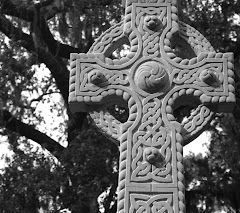 [Message MP3 coming soon]
[Message MP3 coming soon] Jesus said, “I am the light of the world.” Light was associated with God. Scripture speaks of the light of God’s face and the light of God’s presence. The references are too numerous to mention. But Psalm 27:1 is a good example. It says, “The LORD is my light and my salvation.” It’s interesting that some Jewish Rabbis believed the Messiah’s name was “Light”. This belief probably finds its origin in passages which speak of the Messiah such as:
* Isaiah 42.6-7, “I … will make you to be … a light for the Gentiles, to open eyes that are blind, to free captives from prison and to release from the dungeon those who sit in darkness.”
* Isaiah 49.6, “I will also make you a light for the Nations, that you may bring my salvation to the ends of the earth."
* Malachi 4.2, “But for you who revere my name, the sun of righteousness will rise with healing in its wings.”
* Even Zechariah, the father of John the Baptist, sang, “the rising sun will come to us from heaven to shine on those living in darkness and in the shadow of death, to guide our feet into the path of peace.”
Jesus is the light of God’s self-revelation and His salvation.
Then Jesus added that whoever follows Him will never walk in darkness. To follow is to trust and obey. As William Barclay, puts it, “To be followers of Christ is to give body, soul and spirit into the obedience of the Master.” There is a Jewish proverb that further emphasizes what it means to follow. It states, “Follow a rabbi, drink in his words and be covered with the dust of his feet.” The picture is following your master so closely that you are covered by the dust he kicks up while you walk along the road. Jesus says, “whoever follows me (whoever drinks in my words and walks so close so as to be covered by the dust of my feet) will never walk in darkness.” They’ll never live in darkness.
Darkness is a metaphor for the hopelessness, sin, futility and alienation of life lived apart from God. Darkness is the way of the broken world – the way of those who have turned their backs on God and refuse to be turned around. Darkness is the curse of sin and death that we have inherited from the original sin in the Garden of Eden. But Jesus says that whoever follows Him will never walk in darkness, but will have the light of life.
The light of life is either ‘light which issues from the source of life’ or ‘light which gives life’. Or in this case, it is both. Jesus is the light from heaven who came to dwell with people. He is also the light which gives life. He reveals the way of salvation. He is the Way of salvation. Jesus is the Light of life.
But what exactly does this light do? I believe that the Light of life does three things.
It REVEALS. And it reveals in three ways.
* Light permeates and thus the Light of Christ permeates us. It affects every area of our lives. Following Christ is not a half-hearted venture. We can’t allow Christ into parts of our life and keep Him out of others. Every area of our lives – work, rest, play, politics, marriage, family – all of it must be permeated by the Light of Christ.
* Light uncovers. Because the Light of Christ permeates us, it reaches into areas, revealing things we would rather remain hidden (like lifting up a rock and seeing critters scurry away from the light of day). That can make us uncomfortable. But that is the way of Christ. He receives us as we are, but He loves us too much to leave us that way. He changes not simply our behaviors, but our mindset, attitude, motives and desires – our hearts.
* And light guides. We began this series with two images of light: a lighthouse and a flashlight. A lighthouse is a dependable beacon that guides ships through treacherous places to safety. A flashlight is used by those who go out personally in search of the lost, troubled and dying. And so we can look to Christ (like a lighthouse) to guide us to the safety of salvation. But Jesus doesn’t just stand there. He comes to us. Jesus entered the world’s mess to rescue us from slavery to sin and bondage to death. He comes to us and leads us.
So, light reveals, but it also REPELS. We read at the beginning of John, “The light shines in the darkness, but the darkness has not understood it.” Some translate this: “the darkness has not overcome it”. That is the nature of light: it dispels darkness. Where light is, darkness cannot be. When you shine a flashlight in a dark place, you remove the darkness from that place. So it is with the light of Christ. The light of His presence removes the darkness – the hopelessness, sin and futility of life lived apart from God. When we are filled with the light of Christ, darkness has no place in us nor power over us.
And finally, Light RENEWS. Without light, life would not exist. Light causes things to grow. All living things need light to grow, blossom and produce fruit. And light heals. Some people are known to have Seasonal Affective Disorder which stems from seasonal change and lack of sunlight. One of the primary treatments is light. In a sense, only light can help. Similarly, every person has or has had Spiritual Affective Disorder. It comes from living apart from God and only the light of Christ can help. For the Light of Christ renews us – it heals us and causes us to grow. It gives us life and life to the full.
Jesus said, “I am the light of the world. Whoever follows me will never walk in darkness, but will have the light of life.” Jesus is our light and our salvation. In Christ who we are, who God is and who we can become is revealed to us. In Christ we are kept safe because His light repels the darkness. And in Christ, we are being renewed into the men and women we were created to be.
Jesus is the star of Christmas because He is the Light of the world. He came to shine so that we could be brought out of darkness and into his wonderful light. Follow Him. Come out of the darkness of trying to make it on your own and follow the Light of the world. Give yourself - body, soul, mind and spirit in obedience to Him. Drink in his words and be covered with the dust of his feet. For He says to you: whoever follows me will never walk in darkness, but will have the light of life.
POINTS TO REMEMBER
Jesus said, “I am the light.” And He said it in an interesting place. The context is the Feast of Tabernacles in the Temple in Jerusalem. It is said that on each night of the feast, the temple court was lit up by large golden bowels filled with oil. (It was said that there was no court in Jerusalem that was not made bright from the light of the temple.) Then, in the brightness of the lamps, men of piety would dance and sing praise as the Levites played their instruments. And the dancing and praising continued until dawn. It was at the end of this feast, after the people had experienced the light of the Temple, that Jesus declared, “I am the light of the world.”
SCRIPTURE TO CONSIDER
John 1.1-9; John 8.12
Psalm 27.1
Isaiah 42.6-7; Isaiah 49.6; Malachi 4.2; Luke 1.76-79
1 Peter 2.9
Isaiah 60-61












